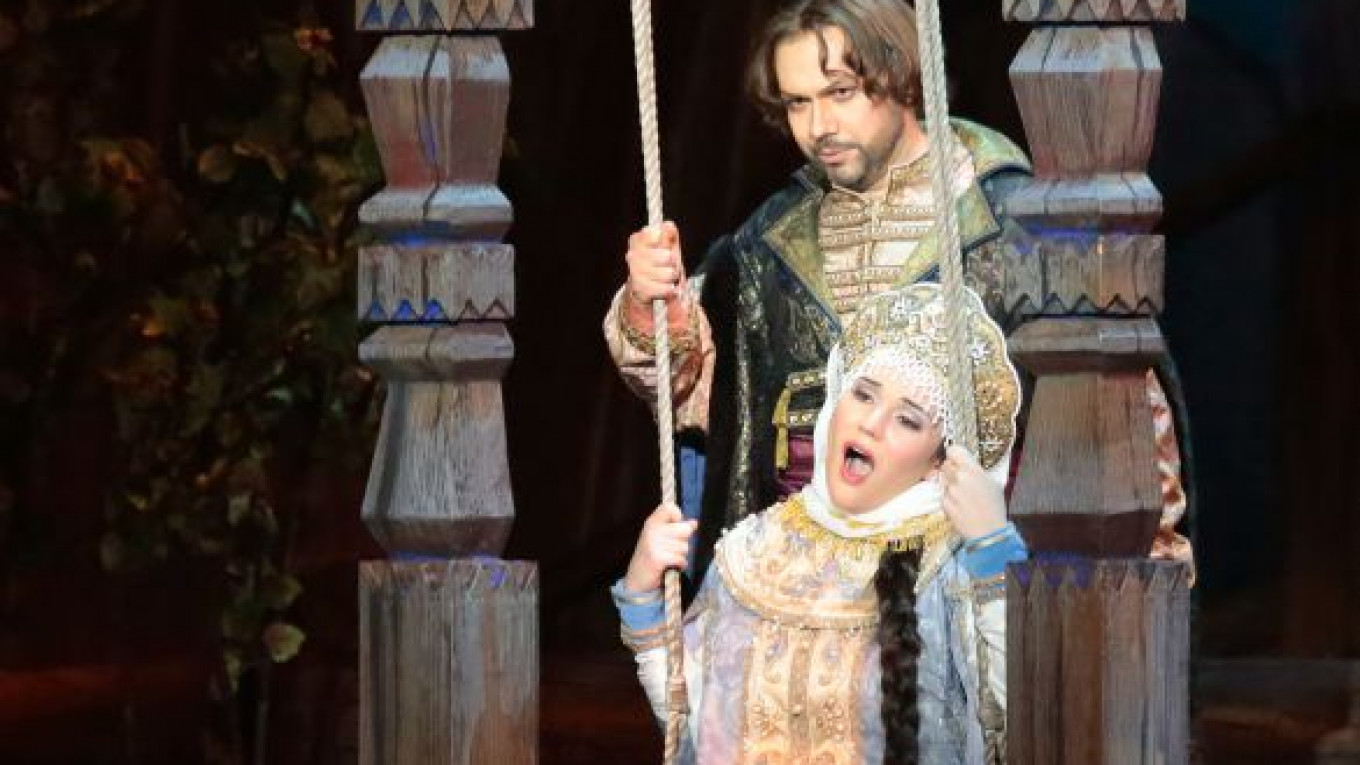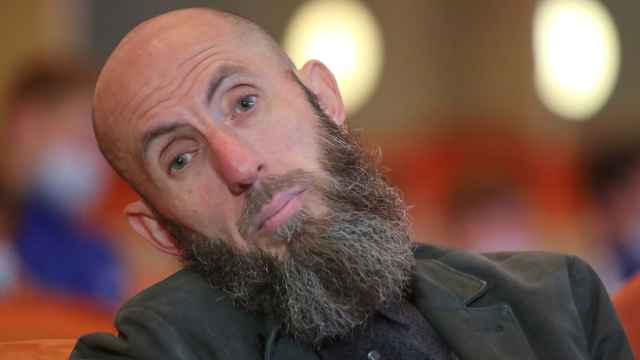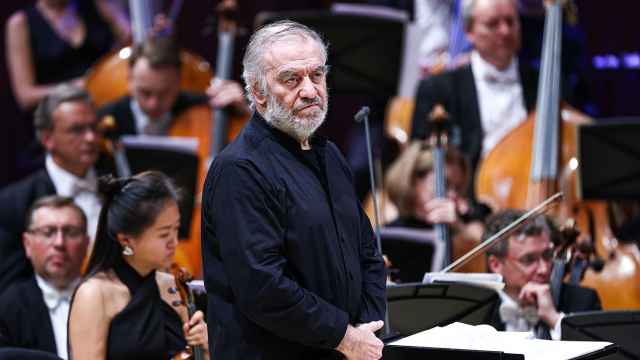Nikolai Rimsky-Korsakov's "The Tsar's Bride," arguably the composer's most popular opera, has returned to the Bolshoi Theater's Main Stage after nearly a decade's absence, in a production that combines elements both old and new.
Old are the set designs of Fyodor Fyodorovsky, first seen in 1955 and thereafter at some 770 performances over the following 66 years. New are a refashioning of the sets by designer Alyona Pikalova, with solid structures replacing much of what was previously painted on canvas, and new costumes by Yelena Zaytseva. The result is quite beautiful, in a picture-book sort of way: 16th-century Russia scrubbed spotlessly clean, with its denizens immaculately dressed in apparel that looks to have come straight from the laundry.
Also new is a staging by Israeli director Julia Pevsner, who has previously worked at the Bolshoi as assistant to directors Francesca Zambello, in Giacomo Puccini's "Turandot" and Sergei Prokofiev's "The Fiery Angel," and David Pountney, in Georges Bizet's "Carmen."
The tsar of the opera's title is Ivan the Terrible and the action takes place in 1572 in the Aleksandovskaya Sloboda — now the city of Aleksandrov, located 75 miles northwest of Moscow — to which Ivan retreated during the years 1564 to 1581 together with his court and his band of personal guards, the thuggish oprichniks.
Nearly all the characters in "The Tsar's Bride" are based on historical figures. The bride of the title, Marfa Sobakina, was indeed Tsar Ivan's third wife and died mysteriously just 15 days after their wedding. But the story largely stems from the imagination of playwright Lev Mey, on whose drama of the same title Rimsky-Korsakov based his libretto.
The oprichnik Grigory Gryaznoi has become infatuated with Marfa. He orders a German physician, Bomelius, to create a love potion to use in winning her. Gryaznoi's mistress, Lyubasha, gets wind of the matter and turns to Bomelius to come up with slow-acting poison to administer to Marfa. Meanwhile, Marfa is preparing to marry the young boyar Ivan Lykov. And meanwhile, as well, Marfa is summoned to the tsar's palace as one of a group of maidens from whom the tsar intends to choose a bride.
Marfa returns from the palace and Gryaznoi prepares a toast to honor the betrothal of Marfa and Lykov, slipping the supposed love potion into Marfa's glass. The celebrations abruptly end as a messenger from the palace announces that the tsar has chosen Marfa to become his bride.
The denouement takes place in the palace, where Marfa lies desperately ill. As she dies, Lyubasha reveals that it is she who substituted Bomelius' poison for the love potion. Much blood is subsequently shed.
Unlike the opera's previous staging, created in 1966 and performed until 2012, Pevsner's truly brings the story to life — too much to life, perhaps, in the oprichniks' raucous party hosted by Gryaznoi, though the shenanigans there probably differed little in spirit from what has been reported of holiday parties of the current Russian elite at ski resorts of the French Alps.
"The Tsar's Bride" is rivaled only by "The Invisible City of Kitezh" as the most musically enchanting of all Rimsky-Korsakov's 15 operas. And musically speaking, the newly revamped production proved quite impressive at its opening night performance week before last.
Presiding in the pit was Gennady Rozhdestvensky, the 82-year-old dean of Russian conductors, who, despite his familiar choice of rather leisurely tempos, gave the score an authoritative reading and created an orchestral "atmosphere" of a sort that marked it as the work of a true master of the podium. The Bolshoi's orchestra treated the ears to playing of uncommon brilliance and accuracy.
The Bolshoi somewhat surprisingly handed the role of Marfa on opening night to Ukrainian newcomer Olga Kulchinskaya, a member since last year of the theater's Young Opera Artists Program. But it could hardly have made a better choice. Her pure and expressive soprano, combined with a winning stage manner and appearance, proved a near-perfect fit for the role.
Equally impressive was Agunda Kulayeva, a member of the Novaya Opera troupe since 2005, whose full, rich mezzo-soprano voice and considerable acting skills superbly met the many challenges to be found in the role of Lyubasha.
For Marfa's father, Vasily Sobakin, the Bolshoi turned to veteran bass Vladimir Matorin, who, in his 66th year, still retains a marvelously resonant voice and a commanding stage presence. The other male members of the cast on opening night ranged from adequate to outstanding, with particularly fine performances delivered by tenor Roman Shulakov, as a clear-voiced, sympathetic Ivan Lykov, and tenor Marat Gali, in a nicely etched portrayal of the loathsome Bomelius.
"The Tsar's Bride" (Tsarskaya Nevesta) next plays on May 18 at 6 p.m. and May 20, 21, 22, 23 and 24 at 7 p.m. at the Main Stage of the Bolshoi Theater, located at 1 Teatralnaya Ploshchad. Metro Teatralnaya. Tel. (495) 455-5555. bolshoi.ru
Contact the author at [email protected]
A Message from The Moscow Times:
Dear readers,
We are facing unprecedented challenges. Russia's Prosecutor General's Office has designated The Moscow Times as an "undesirable" organization, criminalizing our work and putting our staff at risk of prosecution. This follows our earlier unjust labeling as a "foreign agent."
These actions are direct attempts to silence independent journalism in Russia. The authorities claim our work "discredits the decisions of the Russian leadership." We see things differently: we strive to provide accurate, unbiased reporting on Russia.
We, the journalists of The Moscow Times, refuse to be silenced. But to continue our work, we need your help.
Your support, no matter how small, makes a world of difference. If you can, please support us monthly starting from just $2. It's quick to set up, and every contribution makes a significant impact.
By supporting The Moscow Times, you're defending open, independent journalism in the face of repression. Thank you for standing with us.
Remind me later.






